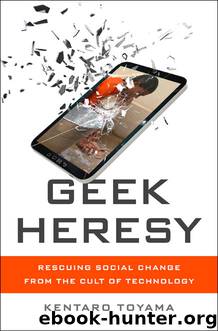Geek Heresy: Rescuing Social Change from the Cult of Technology by Kentaro Toyama

Author:Kentaro Toyama
Language: eng
Format: mobi
ISBN: 9781610395298
Publisher: PublicAffairs
Published: 2015-05-25T14:00:00+00:00
CHAPTER 10
Nurturing Change
Mentorship as a Social-Cause Paradigm
My parents were relaxed about academic achievement, but the “tiger mother” in them roared when it came to my learning the piano. They started me on lessons when I was five and didn’t let me quit until I left home for college. I hated to practice, but my mother forced me to spend an hour a day at the piano – more in the days leading up to recitals or competitions.1 She would accompany me to piano lessons. At home, she’d sit next to me, repeating my teacher’s instructions.
“You may never become a professional pianist,” my father said, “but you will learn useful things.” At the time, it sounded to me like adult mumbo-jumbo, but looking back, I realize he was right. Today I’m at best a clumsy pianist, but I gained much sitting at the keyboard. I learned how to practice complex skills, memorize pages of information, find pleasure even in tedious tasks (like scales), find a place for creativity in repetition, work alone and work with others, handle the anxiety of public performance, interweave intellect and emotion for aesthetic goals, and so on. And I learned perhaps the most valuable lesson of any good education: that so much of life is rooted in both skill and habit, and that almost everything can be learned with sufficient practice. Music, of course, is hardly the only way to learn these things. Others learn similar lessons through sports, dance, visual arts, academics, computer programming – or any other pursuit that involves long-term training and engagement.
There are no shortcuts to mastery. There is no technology, no institution, no policy, no method that can turn a novice into a concert pianist overnight. Metronomes and tuners are important aids for learning. And technologies like radio and iPods allow you to “scale” music very easily, if merely playing it back is the goal. But you’d never call someone a musician just because they could flip the switch on a player piano. They have to be able to create music themselves. True virtuosity requires years of motivated effort.
If that’s true for an individual, what would it take to create a whole nation of concert musicians? Venezuela offers a clue. In the 1950s and 1960s, its two biggest cities, Caracas and Maracaibo, were home to a few professional orchestras. These elite groups were funded by Venezuelan oil, but almost all their members were European or North American. José Antonio Abreu, a petroleum economist who played piano and violin, was dismayed by the lack of opportunity for Venezuelan musicians, so in 1975 he called together several friends to start a youth orchestra. On the first day, just eleven people showed up in a garage. But they were united by passion, practiced all day, and then went home and recruited others. On the second day, there were twenty-five. On the third, forty-six.
Within a month, there was an orchestra of seventy-five members, some of whom could barely play their instruments. Abreu held rehearsals for up to twelve hours a day.
Download
This site does not store any files on its server. We only index and link to content provided by other sites. Please contact the content providers to delete copyright contents if any and email us, we'll remove relevant links or contents immediately.
| Automotive | Engineering |
| Transportation |
Whiskies Galore by Ian Buxton(42014)
Introduction to Aircraft Design (Cambridge Aerospace Series) by John P. Fielding(33128)
Small Unmanned Fixed-wing Aircraft Design by Andrew J. Keane Andras Sobester James P. Scanlan & András Sóbester & James P. Scanlan(32800)
Craft Beer for the Homebrewer by Michael Agnew(18245)
Turbulence by E. J. Noyes(8049)
The Complete Stick Figure Physics Tutorials by Allen Sarah(7373)
The Thirst by Nesbo Jo(6944)
Kaplan MCAT General Chemistry Review by Kaplan(6933)
Bad Blood by John Carreyrou(6621)
Modelling of Convective Heat and Mass Transfer in Rotating Flows by Igor V. Shevchuk(6440)
Learning SQL by Alan Beaulieu(6291)
Weapons of Math Destruction by Cathy O'Neil(6280)
Man-made Catastrophes and Risk Information Concealment by Dmitry Chernov & Didier Sornette(6019)
Digital Minimalism by Cal Newport;(5764)
Life 3.0: Being Human in the Age of Artificial Intelligence by Tegmark Max(5558)
iGen by Jean M. Twenge(5416)
Secrets of Antigravity Propulsion: Tesla, UFOs, and Classified Aerospace Technology by Ph.D. Paul A. Laviolette(5371)
Design of Trajectory Optimization Approach for Space Maneuver Vehicle Skip Entry Problems by Runqi Chai & Al Savvaris & Antonios Tsourdos & Senchun Chai(5068)
Pale Blue Dot by Carl Sagan(5008)
